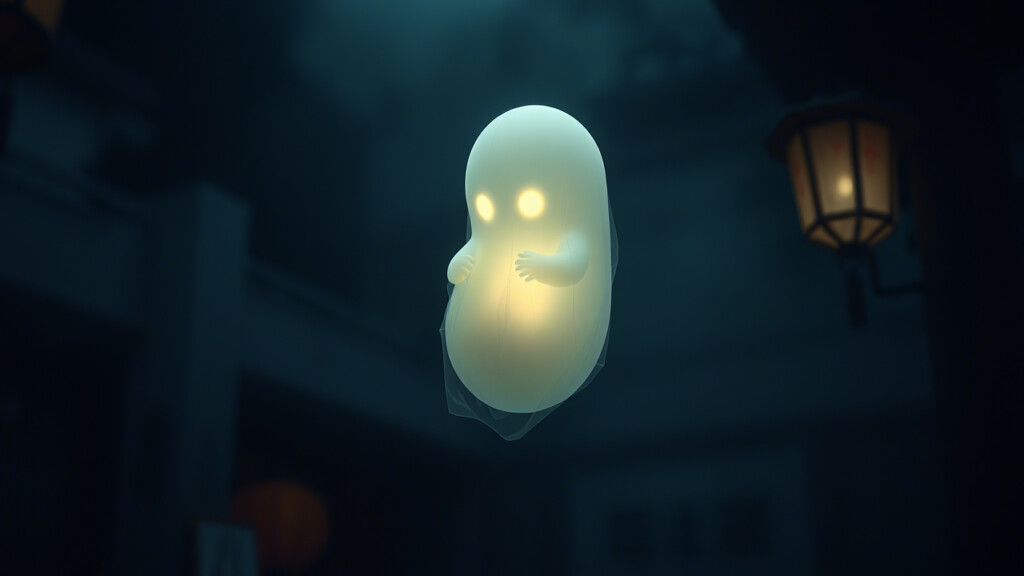Have you ever looked at an egg and felt an inexplicable sadness creeping into your heart? In Korean folklore, beneath its smooth, lifeless shell may lie the sorrowful cries of the Dalgyal Gwishin—the wandering spirits of unborn infants, carrying the pain of separation and an unfulfilled longing for life.

A Faceless Form – A Voiceless Sorrow
What is Dalgyal Gwishin? This is a type of ghost in Korean legends, also known as the “Egg Ghost.” Its form is eerie and deeply unsettling—completely white, smooth, and devoid of any facial features. Sometimes, it is described with a wide, grotesque mouth, but more often, it appears as nothing more than a blank, floating entity, eerily silent yet profoundly haunting.
This faceless image represents absence, loss, and the terror of souls that never had the chance to fully take form before being torn from existence. The empty face of the Dalgyal Gwishin is like a mirror reflecting the grief of parents who have lost their children, the sorrow of spirits that never had the chance to utter their first cry.
Weeping in the Night – A Cry for an Unfinished Life
Unlike vengeful spirits seeking retribution, the legend of Dalgyal Gwishin is steeped in tragedy—an existence of loneliness, weakness, and sorrow. Their cries echo through the night, sometimes soft and pitiful like stifled sobs, other times piercing and mournful, stirring an indescribable sense of sympathy and unease. These cries lament a life that never had a chance to be lived, dreams and hopes extinguished before they could even begin.
It is said that the ghostly wails of the Dalgyal Gwishin can be heard in desolate, eerie places, such as:
- Abandoned houses—where women once suffered miscarriages or where infants passed away.
- Deserted pathways and near cemeteries—where tiny, forgotten graves lie beneath the earth.
- Deep forests—where tragic secrets remain buried and unheard.
From Forsaken Children…
The origins of the Dalgyal Gwishin are deeply tied to sorrowful tales of abandoned children, unwanted pregnancies, and infants who perished due to illness, poverty, or neglect. In ancient Korean society, where patriarchal values often led to the preference for male offspring, the abandonment or termination of female infants was a heartbreaking reality.

These tiny souls, never embraced, never protected, became Egg Ghosts, wandering the mortal realm with lingering sorrow and an unfulfilled yearning for life.
…To a Symbol of Loss and Unhealed Pain
The legend of Dalgyal Gwishin serves as a solemn reminder of the preciousness of life, no matter how fragile. The egg, a universal symbol of birth and new beginnings, paradoxically becomes a symbol of endings and grief. Dalgyal Gwishin lingers as a haunting embodiment of life’s fragility and the silent tragedies hidden beneath seemingly ordinary existence.
Even today, the issue of abortion remains a significant concern in South Korea. While the number of cases has declined, the dilemma persists. According to the Korea Institute for Health and Social Affairs (KIHASA), approximately 32,000 abortions were performed in 2020, with most cases linked to economic and social circumstances. This number, though only the visible surface of a deeper issue, suggests the continued existence of countless Dalgyal Gwishin—unheard and unremembered souls still lingering between life and death.
Is Dalgyal Gwishin Truly Frightening?
Compared to vengeful spirits, Dalgyal Gwishin does not seek revenge, nor does it terrorize the living with violence. Yet, its silent suffering is perhaps even more terrifying. The hushed cries in the darkness, the faceless presence, the lingering sorrow—these create a fear that is not immediate, but one that lingers in the soul.
Beyond the Pain – Seeking Peace
Though the legend of Dalgyal Gwishin is somber, it carries a poignant message: cherish life, no matter how small or fleeting. Show love and compassion for the vulnerable, and face the pain of loss with understanding and kindness.
This tale serves as a reminder that even in the darkest tragedies, there is space for healing. Acknowledging sorrow, sharing burdens, and embracing compassion may allow these wandering souls—and perhaps even the ghosts within our own hearts—to finally find peace.
On a quiet night, if you ever hear the faint sound of weeping in the wind, perhaps it is the voice of a Dalgyal Gwishin—longing to be heard, yearning for understanding…
